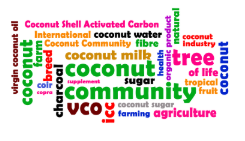In Vitro Characterization of Indigenous Coconut Varieties (Cocos nucifera L.) of Sri Lanka for Water Stress Tolerance
Abstract
Coconuts show a remarkable yield drop due to long dry periods caused by global climatic changes. Thus, breeding for drought tolerance has become a priority in coconut breeding in Sri Lanka. Five coconut varieties indigenous to Sri Lanka, namely Ran thembili, Gon thembili, Porapol, Bodiri and Red dwarf were screened for their drought tolerance potential in vitro. Mature zygotic embryos collected from self pollinated nuts of each variety were germinated and developed into plants with one photosynthetic leaf in Y3 medium. Water stress condition was induced by application of Polyethylene Glycol (PEG) into the culture medium. The level of PEG in culture medium was gradually increased from 2% to 7% until the plants showed water stress symptoms in leaves; yellowing and necrosis. More than 75% of zygotic embryos of all tested coconut varieties successfully germinated in vitro and developed into plants. Plants of all tested coconut varieties survived water stress caused by 4% to 6% PEG and the percentages of plant survival at different levels of PEG varied among different coconut varieties. Variety Ran thembili showed the highest survival rate (27%) at 6% PEG and overall best plant growth performances at 4% PEG among the five coconut varieties tested. Red dwarf showed the lowest survival rate at 4% to 6% PEG indicating its susceptibility to water stress. Among the coconut varieties tested, zygotic embryos of Ran thembili showed the highest drought tolerance potential.
References
Batugal P and Engelmann F (Eds.) (1998). Coconut embryo in vitro culture. IPGRI-APO, Sedang, Malaysia, 164p.
Bloch D and Hoffmann C (2005). Seasonal development of genotypic differences in sugar beet (Beta vulgaris L.) and their interaction with water supply. American Journal of Plant Physiology 6: 126-143.
Eeuwens C J (1978). Effects of organic nutrients and hormones on growth and development of tissue explants from coconut (Cocos nucifera L.) and date (Phoenix dactylifera) palm cultured in vitro. Physiologia Plantarum 42: 173-178.
Karunaratne S, Santha S and Kovoor A (1991). An in vitro assay for drought-tolerant coconut germplasm. Euphytica 53: 25-30.
Larher F, Leeport L, Petrivalski M and Chappart M (1993).Effectors for the osmoinduced praline response in higher plants. Plant Physiology and Biochemistry 31: 911-922.
Liyanage D V, Wickramaratne M R T, Jayasekera C (1988) Coconut breeding in Sri Lanka. Cocos 6: 1-26.
Manoj K and Uday D (2007). Gradient in vitro testing of tomato (Solanum lycopersicum) genotypes by inducing water deficit: A new approach to screen germplasm for drought tolerance. Asian journal of plant sciences 6: 934-940.
Matheka J M, Magiri E, Rasha A O and Machuka J (2008). In vitro selection and characterization of drought tolerant somaclones of tropical maize (Zea mays L.). Biotechnology 7: 641-650.
Pech y Ake A, Santamaria J, Souza R, Talavera C. Maust B and Oropeza C (2002). Changes in culture conditions and medium formulation to improve efficiency of in vitro culture of coconut embryos in Mexico. In: Coconut Embryogenesis In Vitro: Part II (Eds. F. Engelmann, P. Batugal, J. Oliver) pp. 122-137. IPGRI-APO, Sedang, Malaysia.
Pech y Ake A, Souza R, Maust B, Santamaria J and Oropeza C (2004). Enhanced aerobic respiration improves in vitro coconut embryos germination and culture. In Vitro Cellular and Developmental Biology of Plants 40:90-94.
Pech y Ake A, Maust B, Orozco-Segeria A and Oropeza C (2007). The effect of gibberellic acid on the in vitro germination of coconut zygotic embryos and their conversion into plants. In Vito Cellular and Developmental Biology of Plants 43:247-253.
Perera L, Perera S A C N, Bandaranayeke C K and Harries H (2009). Coconut (Chapter 12), In: Oil Crops, Eds. J Voll and I Rajcan, Springer Publishers, USA
Petkova D, Netjialkov D and djilianov D (1995). Early screening for drought tolerance in cultivated alfalfa. Bulgarian Journal of Agricultural Sciences 1: 429-432.
Rai K M, Kalia R K, Singh R, Gangola M P and Dhawan A K (2011). Developing stress tolerant plants through in vitro selection-An overview of the recent progress. Environmental and Experimental Botany 71: 89-98.
Vidhanaarachchi V R M, Weerakoon L K, Fernando S C, Gamage C K A and Santha E S (1998). Status of research on coconut embryo culture and acclimatization techniques in Sri Lanka. Proceedings of the first workshop on embryo culture, 27-31 October, Albey, Philippines pp: 85-88
Weerakoon L K (2000). Annual Report of the Coconut Research Institute of Sri Lanka. p. 171-172.











